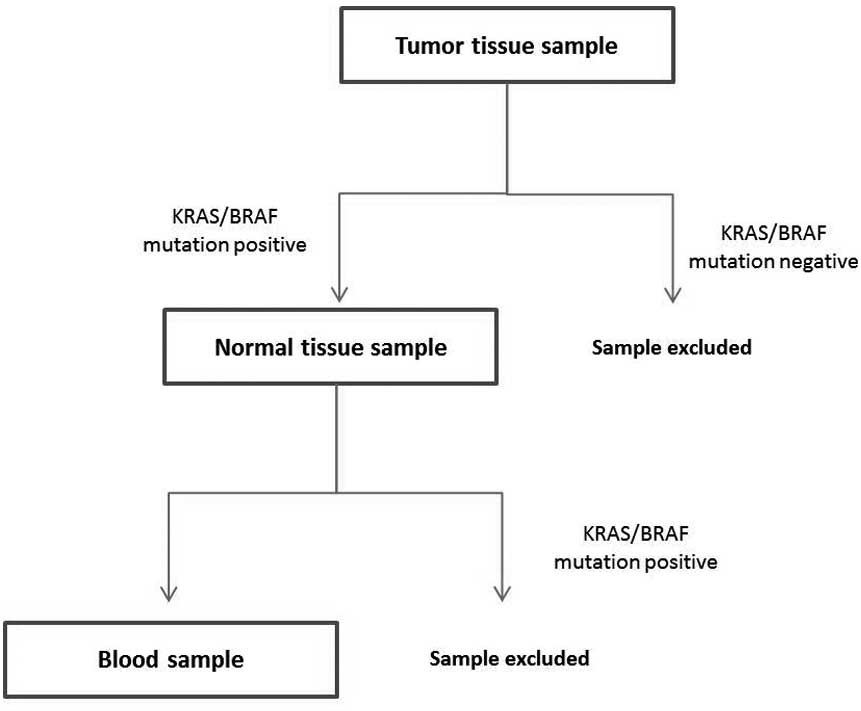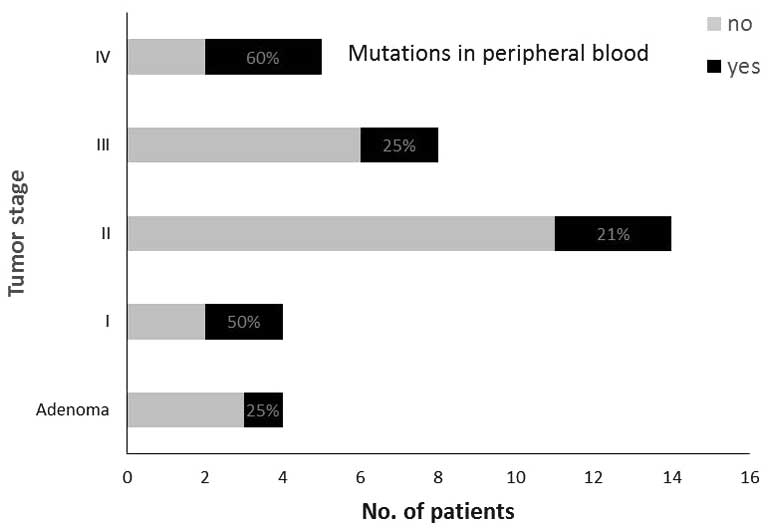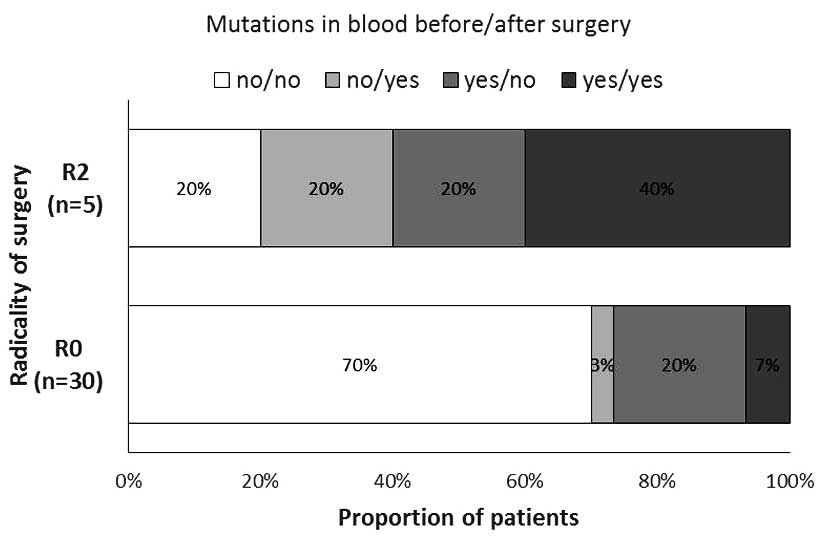|
1
|
Brenner H, Kloor M and Pox CP: Colorectal
cancer. Lancet. 383:1490–1502. 2014. View Article : Google Scholar : PubMed/NCBI
|
|
2
|
Pita-Fernández S, Alhayek-Aí M,
González-Martín C, López-Calviño B, Seoane-Pillado T and
Pértega-Díaz S: Intensive follow-up strategies improve outcomes in
nonmetastatic colorectal cancer patients after curative surgery: A
systematic review and meta-analysis. Ann Oncol. 26:644–656. 2015.
View Article : Google Scholar : PubMed/NCBI
|
|
3
|
Compton CC: Colorectal carcinoma:
Diagnostic, prognostic, and molecular features. Mod Pathol.
16:376–388. 2003. View Article : Google Scholar : PubMed/NCBI
|
|
4
|
Wittekind C, Compton CC, Greene FL and
Sobin LH: TNM residual tumor classification revisited. Cancer.
94:2511–2516. 2002. View Article : Google Scholar : PubMed/NCBI
|
|
5
|
Wittekind C: Problems with residual tumor
classification, particularly R1. Chirurg. 78:785–791. 2007.(In
German). View Article : Google Scholar : PubMed/NCBI
|
|
6
|
Greene FL: Cancer staging in outcomes
assessment. J Surg Oncol. 110:616–620. 2014. View Article : Google Scholar : PubMed/NCBI
|
|
7
|
Nicholls J: Commentary. Colorectal Dis.
14:1074–1075. 2012. View Article : Google Scholar : PubMed/NCBI
|
|
8
|
Tsouma A, Aggeli C, Pissimissis N,
Lembessis P, Zografos GN and Koutsilieris M: Circulating tumor
cells in colorectal cancer: Detection methods and clinical
significance. Anticancer Res. 28:3945–3960. 2008.PubMed/NCBI
|
|
9
|
Sergeant G, Penninckx F and Topal B:
Quantitative RT-PCR detection of colorectal tumor cells in
peripheral blood-a systematic review. J Surg Res. 150:144–152.
2008. View Article : Google Scholar : PubMed/NCBI
|
|
10
|
Peach G, Kim C, Zacharakis E, Purkayastha
S and Ziprin P: Prognostic significance of circulating tumour cells
following surgical resection of colorectal cancers: A systematic
review. Br J Cancer. 102:1327–1334. 2010. View Article : Google Scholar : PubMed/NCBI
|
|
11
|
Rahbari NN, Aigner M, Thorlund K, Mollberg
N, Motschall E, Jensen K, Diener MK, Büchler MW, Koch M and Weitz
J: Meta-analysis shows that detection of circulating tumor cells
indicates poor prognosis in patients with colorectal cancer.
Gastroenterology. 138:1714–1726. 2010. View Article : Google Scholar : PubMed/NCBI
|
|
12
|
Shen CX, Hu LH, Xia L and Li YR:
Quantitative real-time RT-PCR detection for survivin, CK20 and CEA
in peripheral blood of colorectal cancer patients. Jpn J Clin
Oncol. 38:770–776. 2008. View Article : Google Scholar : PubMed/NCBI
|
|
13
|
Weinberg RA: Leaving home early:
Reexamination of the canonical models of tumor progression. Cancer
Cell. 14:283–284. 2008. View Article : Google Scholar : PubMed/NCBI
|
|
14
|
Klein CA: Cancer. The metastasis cascade.
Science. 321:1785–1787. 2008. View Article : Google Scholar : PubMed/NCBI
|
|
15
|
Allan AL and Keeney M: Circulating tumor
cell analysis: Technical and statistical considerations for
application to the clinic. J Oncol. 2010:4262182010. View Article : Google Scholar : PubMed/NCBI
|
|
16
|
Cohen SJ, Punt CJ, Iannotti N, Saidman BH,
Sabbath KD, Gabrail NY, Picus J, Morse MA, Mitchell E, Miller MC,
et al: Prognostic significance of circulating tumor cells in
patients with metastatic colorectal cancer. Ann Oncol.
20:1223–1229. 2009. View Article : Google Scholar : PubMed/NCBI
|
|
17
|
Dotan E, Cohen SJ, Alpaugh KR and Meropol
NJ: Circulating tumor cells: Evolving evidence and future
challenges. Oncologist. 14:1070–1082. 2009. View Article : Google Scholar : PubMed/NCBI
|
|
18
|
Maheswaran S and Haber DA: Circulating
tumor cells: A window into cancer biology and metastasis. Curr Opin
Genet Dev. 20:96–99. 2010. View Article : Google Scholar : PubMed/NCBI
|
|
19
|
Knijn N, Mekenkamp LJ, Klomp M,
Vink-Börger ME, Tol J, Teerenstra S, Meijer JW, Tebar M, Riemersma
S, van Krieken JH, et al: KRAS mutation analysis: A comparison
between primary tumours and matched liver metastases in 305
colorectal cancer patients. Br J Cancer. 104:1020–1026. 2011.
View Article : Google Scholar : PubMed/NCBI
|
|
20
|
Mostert B, Jiang Y, Sieuwerts AM, Wang H,
Bolt-de Vries J, Biermann K, Kraan J, Lalmahomed Z, van Galen A, de
Weerd V, et al: KRAS and BRAF mutation status in circulating
colorectal tumor cells and their correlation with primary and
metastatic tumor tissue. Int J Cancer. 133:130–141. 2013.
View Article : Google Scholar : PubMed/NCBI
|
|
21
|
Pantel K and Alix-Panabières C: Real-time
liquid biopsy in cancer patients: Fact or fiction? Cancer Res.
73:6384–6388. 2013. View Article : Google Scholar : PubMed/NCBI
|
|
22
|
Bidard FC, Weigelt B and Reis-Filho JS:
Going with the flow: From circulating tumor cells to DNA. Sci
Transl Med. 5:207ps142013. View Article : Google Scholar : PubMed/NCBI
|
|
23
|
Bettegowda C, Sausen M, Leary RJ, Kinde I,
Wang Y, Agrawal N, Bartlett BR, Wang H, Luber B, Alani RM, et al:
Detection of circulating tumor DNA in early- and late-stage human
malignancies. Sci Transl Med. 6:224ra242014. View Article : Google Scholar : PubMed/NCBI
|
|
24
|
Diehl F, Schmidt K, Choti MA, Romans K,
Goodman S, Li M, Thornton K, Agrawal N, Sokoll L, Szabo SA, et al:
Circulating mutant DNA to assess tumor dynamics. Nat Med.
14:985–990. 2008. View
Article : Google Scholar : PubMed/NCBI
|
|
25
|
Iinuma H, Okinaga K, Egami H, Mimori K,
Hayashi N, Nishida K, Adachi M, Mori M and Sasako M: Usefulness and
clinical significance of quantitative real-time RT-PCR to detect
isolated tumor cells in the peripheral blood and tumor drainage
blood of patients with colorectal cancer. Int J Oncol. 28:297–306.
2006.PubMed/NCBI
|
|
26
|
Tsouma A, Aggeli C, Lembessis P, Zografos
GN, Korkolis DP, Pectasides D, Skondra M, Pissimissis N, Tzonou A
and Koutsilieris M: Multiplex RT-PCR-based detections of CEA, CK20
and EGFR in colorectal cancer patients. World J Gastroenterol.
16:5965–5974. 2010.PubMed/NCBI
|
|
27
|
Lin JK, Lin PC, Lin CH, Jiang JK, Yang SH,
Liang WY, Chen WS and Chang SC: Clinical relevance of alterations
in quantity and quality of plasma DNA in colorectal cancer
patients: Based on the mutation spectra detected in primary tumors.
Ann Surg Oncol. 21(Suppl 4): S680–S686. 2014. View Article : Google Scholar : PubMed/NCBI
|
|
28
|
Wang JY, Wu CH, Lu CY, Hsieh JS, Wu DC,
Huang SY and Lin SR: Molecular detection of circulating tumor cells
in the peripheral blood of patients with colorectal cancer using
RT-PCR: Significance of the prediction of postoperative metastasis.
World J Surg. 30:1007–1013. 2006. View Article : Google Scholar : PubMed/NCBI
|
|
29
|
Uen YH, Lu CY, Tsai HL, Yu FJ, Huang MY,
Cheng TL, Lin SR and Wang JY: Persistent presence of postoperative
circulating tumor cells is a poor prognostic factor for patients
with stage I–III colorectal cancer after curative resection. Ann
Surg Oncol. 15:2120–2128. 2008. View Article : Google Scholar : PubMed/NCBI
|
|
30
|
Ryan BM, Lefort F, McManus R, Daly J,
Keeling PW, Weir DG and Kelleher D: A prospective study of
circulating mutant KRAS2 in the serum of patients with colorectal
neoplasia: Strong prognostic indicator in postoperative follow up.
Gut. 52:101–108. 2003. View Article : Google Scholar : PubMed/NCBI
|
|
31
|
Hsieh JS, Lin SR, Chang MY, Chen FM, Lu
CY, Huang TJ, Huang YS, Huang CJ and Wang JY: APC, K-ras, and p53
gene mutations in colorectal cancer patients: Correlation to
clinicopathologic features and postoperative surveillance. Am Surg.
71:336–343. 2005.PubMed/NCBI
|
|
32
|
Frattini M, Gallino G, Signoroni S,
Balestra D, Lusa L, Battaglia L, Sozzi G, Bertario L, Leo E,
Pilotti S and Pierotti MA: Quantitative and qualitative
characterization of plasma DNA identifies primary and recurrent
colorectal cancer. Cancer Lett. 263:170–181. 2008. View Article : Google Scholar : PubMed/NCBI
|
|
33
|
Lecomte T, Ceze N, Dorval E and
Laurent-Puig P: Circulating free tumor DNA and colorectal cancer.
Gastroenterol Clin Biol. 34:662–681. 2010. View Article : Google Scholar : PubMed/NCBI
|
|
34
|
Kopreski MS, Benko FA, Borys DJ, Khan A,
McGarrity TJ and Gocke CD: Somatic mutation screening:
Identification of individuals harboring K-ras mutations with the
use of plasma DNA. J Natl Cancer Inst. 92:918–923. 2000. View Article : Google Scholar : PubMed/NCBI
|
|
35
|
Lu CY, Uen YH, Tsai HL, Chuang SC, Hou MF,
Wu DC, Juo SH, Lin SR and Wang JY: Molecular detection of
persistent postoperative circulating tumour cells in stages II and
III colon cancer patients via multiple blood sampling: Prognostic
significance of detection for early relapse. Br J Cancer.
104:1178–1184. 2011. View Article : Google Scholar : PubMed/NCBI
|
|
36
|
Allen-Mersh TG, McCullough TK, Patel H,
Wharton RQ, Glover C and Jonas SK: Role of circulating tumour cells
in predicting recurrence after excision of primary colorectal
carcinoma. Br J Surg. 94:96–105. 2007. View
Article : Google Scholar : PubMed/NCBI
|
|
37
|
Lindforss U, Zetterquist H,
Papadogiannakis N and Olivecrona H: Persistence of K-ras mutations
in plasma after colorectal tumor resection. Anticancer Res.
25:657–661. 2005.PubMed/NCBI
|
|
38
|
Wood LD, Parsons DW, Jones S, Lin J,
Sjöblom T, Leary RJ, Shen D, Boca SM, Barber T, Ptak J, et al: The
genomic landscapes of human breast and colorectal cancers. Science.
318:1108–1113. 2007. View Article : Google Scholar : PubMed/NCBI
|
|
39
|
Ličar A, Cerkovnik P and Novaković S:
Distribution of some activating KRAS and BRAF mutations in Slovene
patients with colorectal cancer. Med Oncol. 28:1048–1053. 2011.
View Article : Google Scholar : PubMed/NCBI
|
|
40
|
Gerlinger M, Rowan AJ, Horswell S, Larkin
J, Endesfelder D, Gronroos E, Martinez P, Matthews N, Stewart A,
Tarpey P, et al: Intratumor heterogeneity and branched evolution
revealed by multiregion sequencing. N Engl J Med. 366:883–892.
2012. View Article : Google Scholar : PubMed/NCBI
|
|
41
|
Bork U, Grützmann R, Rahbari NN, Schölch
S, Distler M, Reissfelder C, Koch M and Weitz J: Prognostic
relevance of minimal residual disease in colorectal cancer. World J
Gastroenterol. 20:10296–10304. 2014. View Article : Google Scholar : PubMed/NCBI
|
|
42
|
Yong E: Cancer biomarkers: Written in
blood. Nature. 511:524–526. 2014. View Article : Google Scholar : PubMed/NCBI
|
|
43
|
Chapuis PH, Bokey L, Chan C and Dent OF:
Colorectal cancer staging revisited: Time for critical evaluation?
Colorectal Dis. 14:1043–1044. 2012. View Article : Google Scholar : PubMed/NCBI
|
|
44
|
Wittekind C and Oberschmid B: TNM
classification of malignant tumors 2010: General aspects and
amendments in the general section. Pathologe. 31:333–334, 336–338.
2010.(In German). View Article : Google Scholar : PubMed/NCBI
|

















